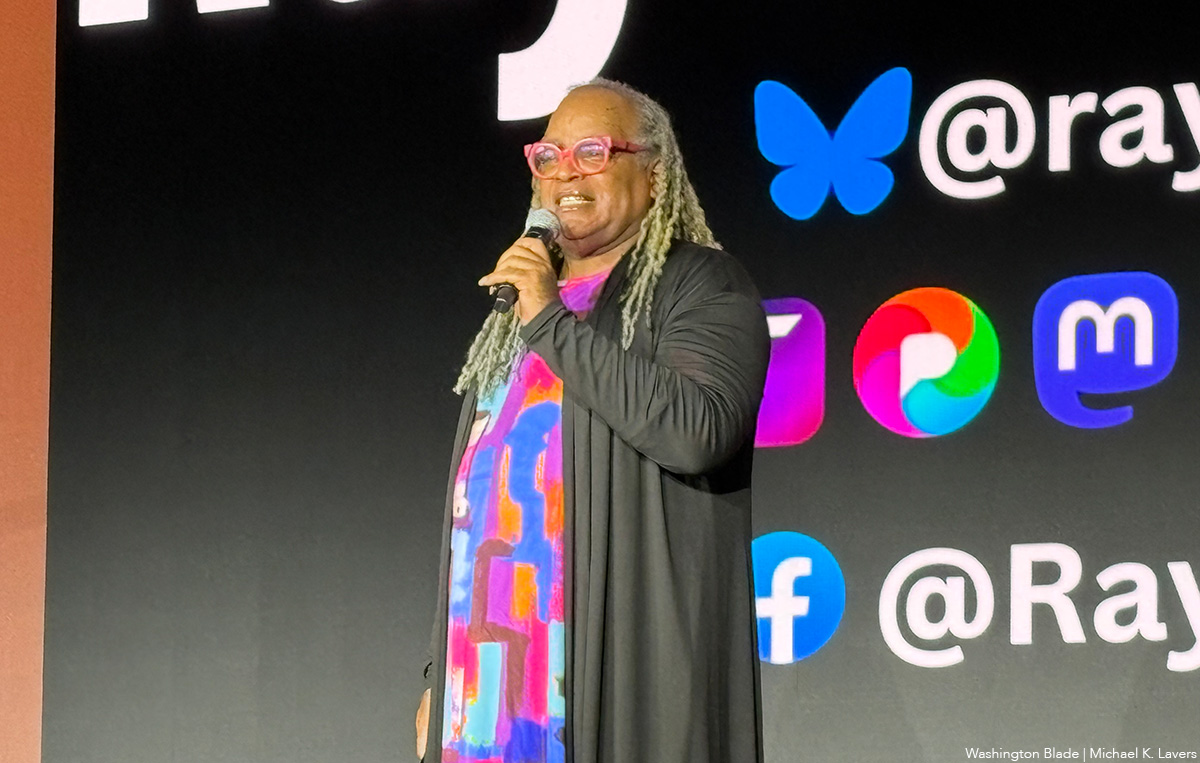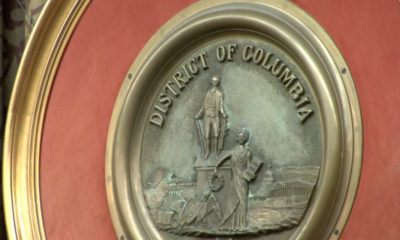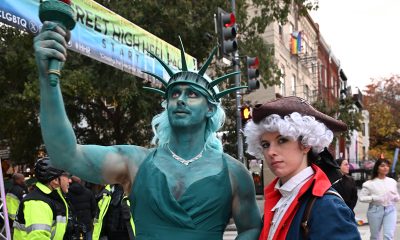Local
Gay marriage opponents denounce ‘notary’ wedding bill
Four of the city’s most vocal opponents of same-sex marriage, including Bishop Harry Jackson, presented or submitted testimony at a D.C. Council hearing on Oct. 14 expressing opposition to a bill that would allow marriages to be performed in D.C. by a notary public.
Another three witnesses, including D.C. gay activist Bob Summersgill, who coordinated lobbying for the same-sex marriage law, testified in favor the bill, the Marriage Officiant Amendment Act of 2010.
The bill would add D.C. to the ranks of Florida, South Carolina and Maine that currently allow a notary public to perform a civil wedding.
D.C. Council member Phil Mendelson (D-At-Large), chair of the Council’s Committee on Public Safety and the Judiciary, presided over the hearing. He noted that the bill under consideration applies to all marriages and should not be viewed as an extension of the same-sex marriage bill.
But local gay rights and same-sex marriage opponents Minister Leroy Swailes, Michael Sindram, and Richard Urban testified that, coming just a few months after the same-sex marriage law took effect, the notary marriage bill would continue what they called the city’s trend toward disrupting traditional marriage.
“It seems to be a way to push through more same-sex marriages and to further weaken the institution of marriage in my opinion,” Urban told the committee. “Having notaries perform marriages is a bad idea.”
Jackson, who did not appear in person, arranged for Carl Hayes, one of his supporters, to read his testimony.
“Implicit in the proposed law’s dramatic change in venues and officials is a devaluation of both the decision to get married and the institution of marriage,” Hayes quoted Jackson as saying.
“Changing the type and caliber of officiants could result in creating an atmosphere in which citizens enter into the depths of legal and personal commitment required by marriage without giving the decision the reverence and the solemnity it requires,” Hayes read from Jackson’s testimony.
D.C. residents Steven Lowe and Melody Hensley, who said they were involved with local secular humanist groups, joined Summersgill in supporting the bill as a means of providing another option for couples who choose to marry outside a church or religious setting.
Lowe noted that under the current law, non-religious weddings can only be performed by judges, who limit their availability to people who know them personally, and court-designated “officiants” who perform civil marriages in a small room at the D.C. courthouse that can’t accommodate more than about a dozen guests.
He said designating notaries public to perform civil marriages would enable all couples choosing a non-religious ceremony to arrange for a notary to marry them at locations ranging from private homes to large reception halls.
Summersgill called on the Council to expand the bill to create “professional, non-clergy licensed marriage officers” to perform marriages in addition to a notary public. He also called for the bill to create a one-day “marriage officiant” designation that would allow couples to choose a friend or relative to perform their marriage who doesn’t have to become a notary or marriage officer to do so.
Mendelson told the Blade he believes more research is needed to look into issues surrounding the bill. He said he has no immediate plans to seek a vote on the bill in committee or before the full Council.
The bill was co-introduced by Council members Mary Cheh (D-Ward 3), Jack Evans (D-Ward 2), and David Catania (I-At-Large). Council members Jim Graham (D-Ward 1) and Tommy Wells (D-Ward 6) co-sponsored the bill.
Virginia
McPike wins special election for Va. House of Delegates
Gay Alexandria City Council member becomes 8th LGBTQ member of legislature

Gay Alexandria City Council member Kirk McPike emerged as the decisive winner in a Feb. 10 special election for a seat in the Virginia House of Delegates representing Alexandria.
McPike, a Democrat, received 81.5 percent of the vote in his race against Republican Mason Butler, according to the local publication ALX Now.
He first won election to the Alexandria Council in 2021. He will be filling the House of Delegates seat being vacated by Del. Elizabeth Bennett-Parker (D-Alexandria), who won in another Feb. 10 special election for the Virginia State Senate seat being vacated by gay Sen. Adam Ebbin (D-Alexandria).
Ebbin is resigning from his Senate next week to take a position with Virginia Gov. Abigail Spanberger’s administration.
Upon taking his 5th District seat in the House of Delegate, McPike will become the eighth out LGBTQ member of the Virginia General Assembly. Among those he will be joining is Sen. Danica Roem (D-Manassas), who became the Virginia Legislature’s first transgender member when she won election to the House of Delegates in 2017 before being elected to the Senate in 2023.
“I look forward to continuing to work to address our housing crisis, the challenge of climate change, and the damaging impacts of the Trump administration on the immigrant families, LGBTQ+ Virginians, and federal employees who call Alexandria home,” McPike said in a statement after winning the Democratic nomination for the seat in a special primary held on Jan. 20.
McPike, a longtime LGBTQ rights advocate, has served for the past 13 years as chief of staff for gay U.S. Rep. Mark Takano (D-Calif.) and has remained in that position during his tenure on the Alexandria Council. He said he will resign from that position before taking office in the House of Delegates.
Local
Local LGBTQ groups, activists to commemorate Black History Month
Rayceen Pendarvis to moderate Dupont Underground panel on Sunday

LGBTQ groups in D.C. and elsewhere plan to use Black History Month as an opportunity to commemorate and celebrate Black lives and experiences.
Team Rayceen Productions has no specific events planned, but co-founder Rayceen Pendarvis will attend many functions around D.C. this month.
Pendarvis, a longtime voice in the LGBTQ community in D.C. moderated a panel at Dupont Underground on Feb. 8. The event, “Every (Body) Wants to Be a Showgirl,” will feature art from Black burlesque artists from around the country. Pendarvis on Feb. 23 will attend the showing of multimedia play at the Lincoln Theatre that commemorates the life of James Baldwin.
Equality Virginia plans to prioritize Black voices through a weekly online series, and community-based story telling. The online digital series will center Black LGBTQ voices, specifically trailblazers and activists, and contemporary Black queer and transgender people.
Narissa Rahaman, Equality Virginia’s executive director, stressed the importance of the Black queer community to the overall Pride movement, and said “Equality Virginia is proud to center those voices in our work this month and beyond.”
The Capital Pride Alliance, which hosts Pride events in D.C., has an alliance with the Center for Black Equity, which brings Black Pride to D.C. over Memorial Day weekend. The National LGBTQ Task Force has no specific Black History Month events planned, but plans to participate in online collaborations.
Cathy Renna, the Task Force’s director of communications, told the Washington Blade the organization remains committed to uplifting Black voices. “Our priority is keeping this at the forefront everyday,” she said.
The D.C. LGBTQ+ Community Center is also hosting a series of Black History Month events.
The D.C. Public Library earlier this year launched “Freedom and Resistance,” an exhibition that celebrates Black History Month and Martin Luther King Jr. It will remain on display until the middle of March at the Martin Luther King Jr. Memorial Library at 901 G St., N.W.
District of Columbia
U.S. Attorney’s Office drops hate crime charge in anti-gay assault
Case remains under investigation and ‘further charges’ could come

D.C. police announced on Feb. 9 that they had arrested two days earlier on Feb. 7 a Germantown, Md., man on a charge of simple assault with a hate crime designation after the man allegedly assaulted a gay man at 14th and Q Streets, N.W., while using “homophobic slurs.”
But D.C. Superior Court records show that prosecutors with the Office of the U.S. Attorney for D.C., which prosecutes D.C. violent crime cases, charged the arrested man only with simple assault without a hate crime designation.
In response to a request by the Washington Blade for the reason why the hate crime designation was dropped, a spokesperson for the U.S. Attorney’s office provided this response: “We continue to investigate this matter and make no mistake: should the evidence call for further charges, we will not hesitate to charge them.”
In a statement announcing the arrest in this case, D.C. police stated, “On Saturday, February 7, 2026, at approximately 7:45 p.m. the victim and suspect were in the 1500 block of 14th Street, Northwest. The suspect requested a ‘high five’ from the victim. The victim declined and continued walking,” the statement says.
“The suspect assaulted the victim and used homophobic slurs,” the police statement continues. “The suspect was apprehended by responding officers.”
It adds that 26-year-old Dean Edmundson of Germantown, Md. “was arrested and charged with Simple Assault (Hate/Bias).” The statement also adds, “A designation as a hate crime by MPD does not mean that prosecutors will prosecute it as a hate crime.”
Under D.C.’s Bias Related Crime Act of 1989, penalties for crimes motivated by prejudice against individuals based on race, religion, sexual orientation, gender identity, disability, and homelessness can be enhanced by a court upon conviction by one and a half times greater than the penalty of the underlying crime.
Prosecutors in the past both in D.C. and other states have said they sometimes decide not to include a hate crime designation in assault cases if they don’t think the evidence is sufficient to obtain a conviction by a jury. In some instances, prosecutors have said they were concerned that a skeptical jury might decide to find a defendant not guilty of the underlying assault charge if they did not believe a motive of hate was involved.
A more detailed arrest affidavit filed by D.C. police in Superior Court appears to support the charge of a hate crime designation.
“The victim stated that they refused to High-Five Defendant Edmondson, which, upon that happening, Defendant Edmondson started walking behind both the victim and witness, calling the victim, “bald, ugly, and gay,” the arrest affidavit states.
“The victim stated that upon being called that, Defendant Edmundson pushed the victim with both hands, shoving them, causing the victim to feel the force of the push,” the affidavit continues. “The victim stated that they felt offended and that they were also gay,” it says.
-

 Virginia3 days ago
Virginia3 days agoMcPike wins special election for Va. House of Delegates
-

 New York5 days ago
New York5 days agoPride flag removed from Stonewall Monument as Trump targets LGBTQ landmarks
-

 Florida5 days ago
Florida5 days agoDisney’s Gay Days ‘has not been canceled’ despite political challenges
-

 District of Columbia5 days ago
District of Columbia5 days agoCapital Pride wins anti-stalking order against local activist




















